Ecological notes
Good tips for the vegetable garden
Easy vegetables: leeks, cabbages, radishes, carrots, green peas and green beans (children love sowing the seeds), potatoes if you have space (harvesting them always arouses great enthusiasm, because planting 5 to 7 potatoes in the spring will bring you in several kilos), artichokes in drained soil and a mild climate (provide enough space), with grey leaves and very pretty flowers, cucurbitaceae (pumpkin, zucchini) to “occupy” wire netting, tomatoes planted in the sun.
Aromatic plants: they are perennials so they do not need to be replanted each year. Mint (isolate it or surround it with an anti-root barrier because it is very invasive), sorrel, lemon balm, tarragon, rhubarb, bay (this may grow 3 to 5m). Be sure to plant sage, rosemary, thyme, savory and green fennel in drained and sunlit soil.
Fruit: strawberry and climbing raspberry plants (they are invasive), gooseberry, blackcurrant bushes, fig-trees with purple fruit, garden blackberry bushes (the juice from a few minutes cooking, filtered with added sugar, will give you delicious sauce and sherbets).
Compost and mulch: do not throw away organic matter which can contribute precious humus for your garden. Unjustifiably, preparing compost puts off many people, including gardeners. Compost participates in the cycle of life, and even children, after shying away from it at first, will be fascinated by the way matter is transformed by waste-eating earthworms, woodlice, centipedes and micro-organisms. If you have a composter, the principle is simple: you harvest from the bottom the usable rotting matter while making space at the top for new waste-matter.
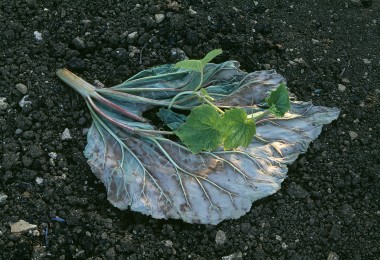
If your waste-matter and ambitions are larger and you want to have compost all year round, provide for three piles. Every four months, begin a new pile. Let the old compost decay for the next eight months, taking care to ventilate it by mixing it up with a fork two during this period. Good ingredients for your compost, if they are well mixed up: household waste (vegetables, ashes, wood-shavings, plant-litter from your pet rodents), garden waste products (leaves, turf, weeds that have not gone to seed). In addition, small twigs boost ventilation if they are mixed up with all the waste products. Compost is also better off when humid, so put it in the shade or water it lightly during summer heat-waves. You can add earthworms to your compost, whether it be in a composter or just a pile. You can get earthworm-composters, easy to set up in a courtyard, on a balcony or even indoors. Make sure it is not lacking in humidity and watch out for fruit fly in an apartment. An exciting ecological game for adults and children. Larger plant waste, such as remains from pruning or clearance of undergrowth, can be ground up to make mulch.
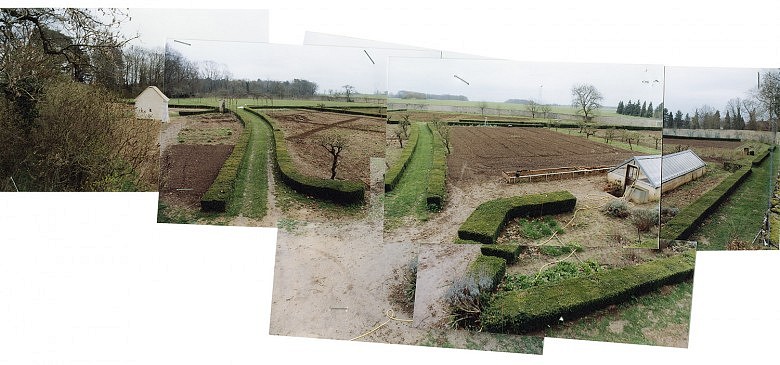 2000: location photos for the project development.[/caption]
2000: location photos for the project development.[/caption]
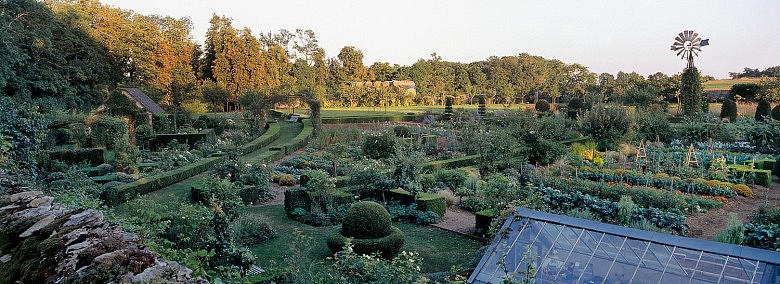 First photo (2002): garden for the cabin on the left, aromatic plant garden near the greenhouse in the foreground, the main path and the pool’s windmill in the background to the right.[/caption]
First photo (2002): garden for the cabin on the left, aromatic plant garden near the greenhouse in the foreground, the main path and the pool’s windmill in the background to the right.[/caption]
 Project for the modern garden behind the pond (2003): box- and hornbeam hedges; in the centre, two pillars of yews.[/caption]
Project for the modern garden behind the pond (2003): box- and hornbeam hedges; in the centre, two pillars of yews.[/caption]
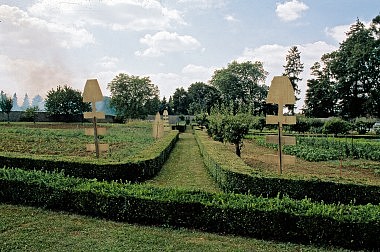 Simulation of the hornbeam hedges in plywood.[/caption]
Simulation of the hornbeam hedges in plywood.[/caption]
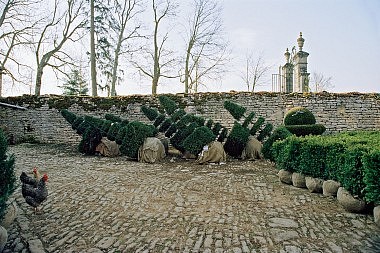 Arrival of the trimmed yews in the farm’s courtyard.[/caption]
Arrival of the trimmed yews in the farm’s courtyard.[/caption]